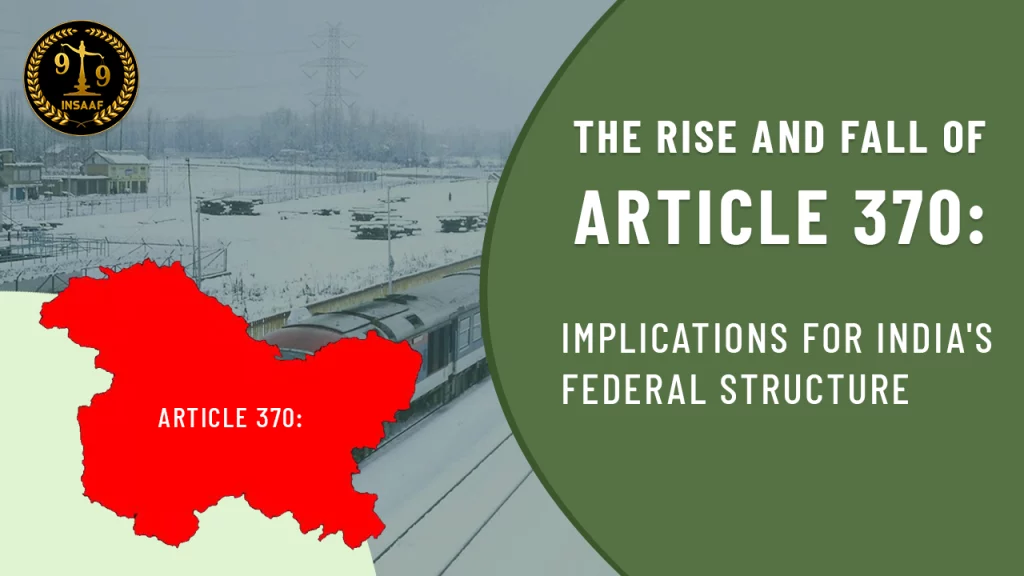

Online Legal Advice from Insaaf99® Online Lawyer Consultation in India


Online Legal Advice from Insaaf99® Online Lawyer Consultation in India

There has been much debate around article 370 in Indian politics and Indian constitutional law. Due to the provision under article 370 the state of Jammu & Kashmir was provided with a special status. However, the article was eventually abrogated in August 2019 over the period of 2 days. This move from the center government garnered mixed reviews and political debate. The revocation of the special status of Jammu and Kashmir stirred controversy and raised questions about autonomy and governance. The revocation of article 370 was even challenged in court however, the Supreme Court of India a landmark decision on December 11th 2023, unanimously upheld the decision taken by the central government. The judgment was given by a five judge bench headed by Chief Justice D.Y. Chandrachud. Let us examine this article 370, the history and abrogation.
Under the constitution of India, article 370 granted autonomous status to the region of Jammu & Kashmir. It was a temporary provision intended to provide a transitional framework drafted by N Gopalaswami Ayyangar, a member of the Constituent Assembly of India, for the integration of the princely state of Jammu and Kashmir into the Indian Union. The constitutional assembly of Jammu and Kashmir had the right to modify, delete or retain it until a plebiscite was held to ascertain public opinion.
Also Read: - Digital Transformation in Payroll: A Closer Look at The AP Employees Pay Slip and official Salary Portal
In the post-Independence era after the partition of British India the state of Jammu & Kashmir had the choice to join either India or Pakistan. Maharaja Hari Singh, then ruler of the princely state, decided to remain independent, however, the state soon became a target of Pakistan back militias and Maharaja Hari Singh sought help from India and signed an instrument of accession on October 26, 1947 and the state became part of India.
Article 370 was introduced as Maharaj Haris Singh wanted to safeguard the autonomy of the region. Article 370, Granted special status to Jammu and Kashmir within the Indian Constitution and allowed the state to create its own constitution and restricted the Indian Parliament's direct legislative power in the region.
Article 370 restricted the power of Indian Parliament in Jammu & Kashmir, law passed by the central government was not immediately applicable to Jammu & Kashmir, and the state had the power to adopt it with modification or changes. It allowed the princely state to have its own constitution, flag, and legislature. It could make its own laws on most matters except defense, foreign affairs, communications, and finance. It also granted special rights and privileges to the state legislature, allowing them to define permanent residents and confer specific rights upon them, including property ownership privileges.

In 2019, by presidential decree, the Parliament redefined the Constituent Assembly of Jammu & Kashmir as the "Legislative Assembly of Jammu & Kashmir" subsequently, presidential authority was established over the region which helped in the revocation of the article 370.
On 5th and 6th August 2019 a resolution was passed in both the houses of parliament (Lok Sabha & Rajya Sabha) and revoked the remaining provision under article 370.
Reorganization of Jammu & Kashmir: After the successful abrogation of article 370, the reorganization act of Jammu & Kashmir was passed. This act divided Jammu & Kashmir into two union territories Jammu & Kashmir and Ladakh
The court stated that Article 370 was a temporary provision and that the State of J&K had no internal sovereignty.
The court further stated that Article 370 was meant to be a 'temporary provision' for two primary reasons.
The court upheld the Jammu and Kashmir reorganization Act, 2019 to the extent it carved out the Union Territory of Ladakh out of the State of J&K.
| SN | Before Abrogation of Article 370 | After Abrogation of Article 370 |
| 1 | Dual Citizenship | Single Citizenship |
| 2 | Separate Flag for the State | Tri color is the only flag |
| 3 | Indian Citizen from Other State were not allowed to buy property | Purchasing of the land by other state of people is now allowed |
| 4 | Article 360 for financial emergency was not applicable | Article 360 of financial emergency now applicable |
| 5 | Right to Information Was Not Applicable | Right to Information is now Applicable |
| 6 | Right to Education was not applicable | Right to Education Applicable |
| 7 | Assembly duration was 6 years | Now it is 5 years |
| 8 | Woman bound lose their citizenship on marrying out of state | Woman marrying out of state or country will still have her rights to retain Indian Citizenship |
| 9 | Earlier there was no provision of reservation for minorities | Now minorities like Hindu & Sikhs will be eligible for reservation. |
There have been mixed reactions to the abrogation of article 370, some supported it and some criticized it. It has been a focal point of debate and discussion, however, it can't be denied that it is a turning point in the history of Jammu & Kashmir and it had a significant impact on India's geopolitical situation.
Also Read: - Name Change in Birth Certificate, How to Get The Name Corrected, Procedure Explained